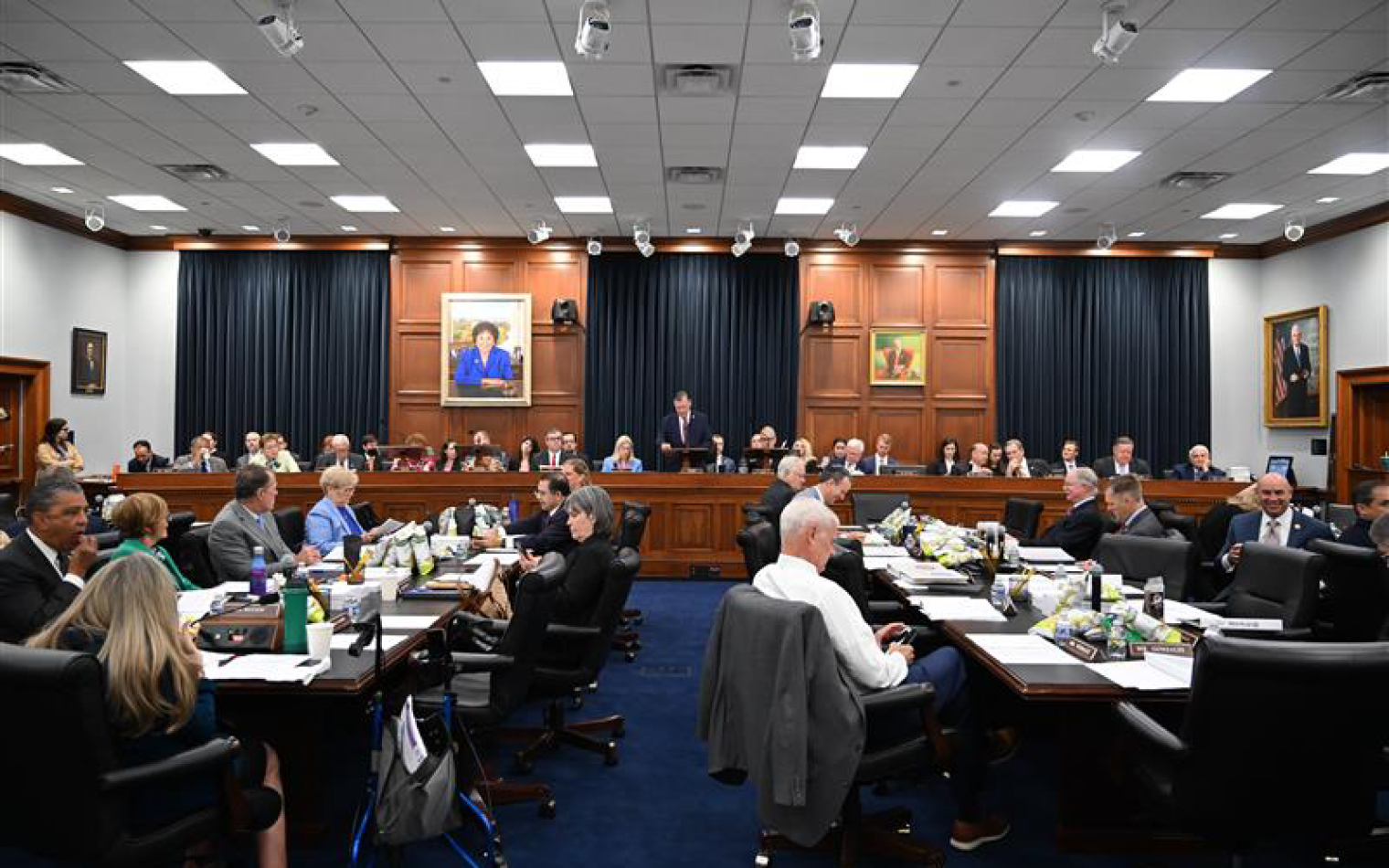| |
| FYI: Science Policy News from AIP |
| THIS WEEK |
|
|
|
|
|
|
| What’s Ahead |
 |
| House appropriators meet to advance spending legislation for fiscal year 2025. House Appropriations Committee |
House to Advance Science Budget Proposals
Republican appropriators in the House have just released reports that detail their science budget proposals for the coming fiscal year. The Energy-Water report covers the Department of Energy; the Commerce-Justice-Science report covers NASA, the National Science Foundation, and the Commerce Department; and the Interior-Environment report covers the U.S. Geological Survey and Environmental Protection Agency. The Appropriations Committee will meet Tuesday morning to debate and amend the reports and the accompanying legislation before passing them to the full House. The committee will meet again on Wednesday morning to consider the report for the National Institutes of Health.
Within a 1.8% overall budget increase for the DOE Office of Science, the committee proposes increases for most major program offices except Biological and Environmental Research, which is targeted for a 5.6% cut. It also proposes level funding for the U.S. contribution to the multinational ITER fusion project, amid news the facility will cost an extra €5 billion and turn on much later than previously planned. The committee does not comment on the delay in the report, though the text may have been prepared before the delay was announced last month.
Within a flat overall budget for NASA’s Science Mission Directorate, the committee proposes an 8% increase to the Planetary Science Division that would be offset by cuts to the Earth Science and Heliophysics divisions. Congress cut the Planetary Science Division budget by 15% in the previous budget cycle as a response to the ballooning cost of the Mars Sample Return project. The House had pushed for robust funding for the project, but the Senate prevailed in the final negotiations, significantly throttling back its budget while NASA reassesses the mission architecture. Now, the House proposes to increase the mission’s budget from the current minimum level of $300 million to at least $650 million and directs NASA to plan for a launch no later than 2031.
Major NASA Policy Bill Up for Debate
The House Science Committee will meet on Wednesday to advance legislation that would broadly update policy for NASA. As of publication, the committee has not released the text of the draft legislation. Committee Chair Frank Lucas (R-OK) has said the bill is one of his priorities for the year, noting that seven years have passed since Congress last comprehensively updated policy for the agency. He has said one area of focus for the bill is improving NASA’s management of science missions. “We support NASA daring to do big things, particularly in science, but how can Congress ensure these projects, particularly flagship missions, remain on schedule and within budget?” Lucas said at a hearing on NASA’s budget in April. Any final legislation will need to gain support from the counterpart committee in the Senate, which has yet to introduce analogous legislation.
Also On Our Radar
- The President’s Council of Advisors on Science and Technology will consider approving a report on “expanding STEM talent in the federal workforce” at a meeting on Thursday.
- NASA’s progress in implementing the decadal strategy for Earth observation from space, published in 2018, will get a midterm checkup in a report the National Academies will release on Thursday.
- The National Science, Technology, and Security Roundtable will hold a capstone workshop next week to reflect on its efforts to improve mutual understanding between the research community, intelligence officials, and law enforcement. The congressional authorization for the roundtable expires at the end of the fiscal year on Sept. 30.
|
|
| Upcoming Events |
All events are Eastern Time, unless otherwise noted. Listings do not imply endorsement. Events beyond this week are listed on our website.
Monday, July 8
Tuesday, July 9
Wednesday, July 10
Thursday, July 11
Friday, July 12
Saturday, July 13
Sunday, July 14
Monday, July 15
Know of an upcoming science policy event either inside or outside the Beltway? Email us at fyi@aip.org.
|
|
| Opportunities |
|
Deadlines indicated in parentheses. Newly added opportunities are marked with a diamond.
Job Openings
Solicitations
Know of an opportunity for scientists to engage in science policy? Email us at fyi@aip.org.
|
|
| Around the Web |
|
News and views currently in circulation. Links do not imply endorsement.
White House
Congress
Science, Society, and the Economy
Education and Workforce
Research Management
Labs and Facilities
Computing and Communications
Space
Weather, Climate, and Environment
Energy
Defense
Biomedical
International Affairs
|
|
|
| |
| This message is sent to you because you signed up for one of our newsletters. To manage your AIP email preferences and newsletter subscriptions ( add or remove ), please click here. Or to automatically unsubscribe from all AIP emails, click here. As a 501(c)(3) non-profit, AIP is a federation that advances the success of our Member Societies and an institute that engages in research and analysis to empower positive change in the physical sciences. The mission of AIP (American Institute of Physics) is to advance, promote, and serve the physical sciences for the benefit of humanity. |
|
| © 2025 American Institute of Physics. |
AIP, 1 Physics Ellipse, College Park MD 20740-3841
301.209.3100 - newsletters@aipcomm.org |
|
|